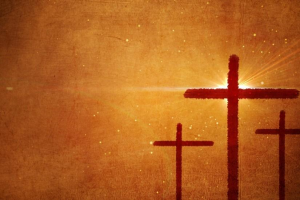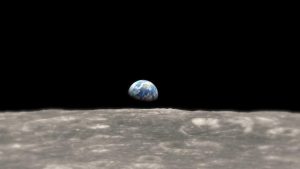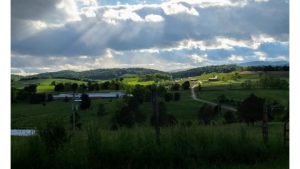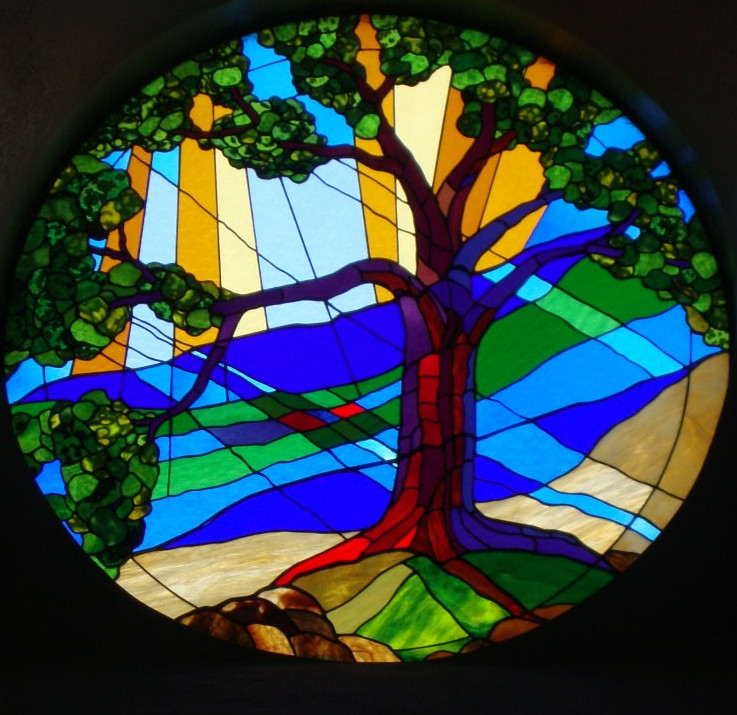
Sermon by Byron Peachey on Genesis 2:15-17 and Matthew 4:1-11
Lent is traditionally a time for holding up before ourselves where we have failed, a time of focus on repentance, but also a time of fasting – as Jesus fasted for 40 days in the wilderness. We might take on specific disciplines. At our Ash Wednesday service we received ashes on our forehead to remind us that we come from the earth, and to the ashes of earth we will return.
About 3 times a week I go for a morning run along Grist Mill Rd where I live… as I start out, Linville creek is just to my right, on my left is cattle pasture, I run past the stop sign at Green Hill Road, where it turns to gravel and after a little rise I turn around and head back. It’s an idyllic setting, where I can imagine all’s right with the world …
Except for these …
These are the beer cans and bottles I’ve picked up over the past 2 months … new ones appear each time I run. The same question rises up in me, “Who would do this? Who throws their cans out the car or truck window, into the ditch, in this day and age? Why?? How hard can it be to take these in to the trash can when you get home?
It makes me angry – That someone would throw these into the ditch day after day after day ..
And it irritates me I have to clean up someone else’s mess, someone else’s carelessness.
There’s more to it than just the cans …
It’s the realization that there are people, my neighbors, wherever they are, who routinely toss their cans & bottles out the window, as if …. It has no consequence. As if the earth is their dumping ground.
What’s the mentality where one can do this over and over? Where you treat this beautiful land in this way?
Some see the world as expendable, to use and throw away … someone else will clean it up, or maybe not, maybe they don’t care if the ditch fills up with trash.
I know these cans and bottles aren’t actually a very consequential problem or even an important issue as we face global warming and climate change. Certainly pollution is a serious problem, but what keeps some of us awake at night is our continued burning of fossil fuels, the warming of our oceans, the steady rise in our average air temperature.
I brought these this morning because they are symbolic –
Of the anger I feel about how the culture I live in “uses” the earth’s resources and then throws them back —
They’re symbolic that I feel powerless over what others do with their choices and how that affects others –
And symbolic as an expression of our wasteful, polluting society
I can pick these up, and take them to the recycle bins at the landfill – so I can have a more pleasant place to run. But the problems of our environment, of pollution and global warming, are on a grand scale, our economy is deeply entangled with systemic dependence on consumption, and burning fossil fuels. Change can seem overwhelming.
Several weeks ago I read these lines from an article in the Washington Post about the climate crisis – “Young people have become the defining face of the climate movement – marching, protesting and berating their elders for bequeathing them an uncertain, unstable future. Underlying their anger, though is another a-word: anxiety. And it’s something they’re increasingly voicing. Parents, teachers and medical professionals across the country find themselves face-to-face with a quandary: How do you raise a generation to look toward the future with hope when all around them swirls a message of apparent hopelessness? The often apocalyptic nature of the news about climate change is perhaps uniquely paralyzing.”
We have deep existential worry & anxiety about our world.
Last quarter a good number of you joined the Sunday school class on climate change – and we heard about this anxiety: "eco anxiety."
It’s so discouraging that our current political leaders have reversed and are moving us in the exact opposite direction we should be going.
I heard someone in our class say, in effect – “I’ve stopped listening to NPR, it just gives me a sense of despair, given our current political crisis."
It can seem like the problems are too big for our small ability to impact change
Take a look at this
This photo is actually pretty old – taken from Apollo 11 in 1969. For over 50 years, we’ve been able to view the earth as this magnificent, beautiful, blue globe, and to see it as a coherent whole in a way never before seen by human beings.
I’m curious what you see, what comes to mind as you gaze at this view of our world?
Some of you remember when photos like this first were shown …
I wonder if it looks different to many of us now, in some way, than 30 or 40 years ago, knowing what we know now about the threats to our globe.
Lent is traditionally a time to take up specific disciplines —- or to give up something –
I’ve seen several friends say goodbye to everyone on Facebook for Lent –
Some of you might be dedicating yourselves to eat more local foods … or to stop eating meat during Lent. Fasting one day a week is some peoples’ practice.
Are there disciplines you have decided to embrace? Or something you’ve decided to let go of during Lent? – Some disciplines can specifically relate to your concern for the earth: walking instead of driving, bicycling to work or to church.
We heard the story of Jesus being tempted in the wilderness – or actually a better word is being tested – by the evil one. The tests are familiar to most of us: While Jesus is hungry, he is tested whether to turn stones into bread – to veer off the discipline of his period of fasting.
The second one is to perform a dramatic gesture and for Jesus to prove himself by throwing himself off from a great height – and test God’s promises
The third, what might have been the biggest test – is the temptation to be the ruler of all the kingdoms of the world and enjoy their splendor, but then must worship Satan – which in my reading, today, one might say, is to worship greed and consumption, and power. Remarkable how little has changed in 2000 years.
What has struck me as I’ve reflected on this passage is not the specific tests or temptations that Jesus faced –although certainly there are contemporary, relevant lessons within these 3 temptations ...
What strikes me is Jesus being tempted to be a grand spectacle – to be a leader who can command adoring crowds, to use his power to singlehandedly transform the world –
Maybe the test is – is Jesus more interested in himself and not as interested in our world?
- Stones to bread
- To “show off” a dramatic magical performance
- To single-handedly exert power and turn the benefits to himself.
- And to do it all by himself — to do it in a spectacular way, which leaves all of us staring as spectators, of leaving the problems up to someone else.
In the next chapter of Matthew, Jesus begins preaching, and yes, drawing crowds of listeners, but he also calls the first of the disciples. His teaching is about bringing the kingdom of heaven to earth. But the narrative is soon sprinkled with the life Jesus has with his disciples, including women, such as Mary & Martha, who were an integral part of the community around Jesus. Jesus does perform miracles, and he does draw large crowds, BUT through pulling together a group of people who are committed to following him … to working together … to sharing their lives with each other
Jesus models and forms those early Jesus communities, which in fact is what we as a congregation model ourselves on. In visiting several CMC small groups over the past few weeks, I’ve been reminded of the strong, vital tradition small group commitments have been within the congregation since it’s beginning.
We are a local expression of the way Jesus modeled forming a community around him, to put into practice his teachings of love for neighbor, love for God, and yes love for God’s creation. And we do that face to face, in our living rooms, around a dining table, or, soon in our back yards.
When we celebrate the ritual of the Lord’s Supper, as we do today, part of that celebration is remembering the community gathered around Jesus, eating and drinking together, not in isolation, but together!
Here’s another photo of the earth – one I’m guessing most of you haven’t seen. In July, 2013, the Cassini spacecraft took this photo from the back/dark side of Saturn, such that Saturn shielded the sun’s light in a way that reveals earth in the distance … I’m curious what feelings or thoughts come to mind as you gaze at this …
It took 7 years for the spacecraft to get there, and it orbited Saturn for 13 years, doing all sorts of studies, before plunging into Saturn in 2017. It’s another extraordinary view of our world, of this corner of creation, of our unique place in the universe. For me, this viewpoint of our earth makes it all the more obvious how we and all the creation around us are one.
In the latter weeks of the climate change class, I heard many of us saying, “we’re ready to put some changes into action!” What can we do?! Of course many of us are already very engaged in either personal, or more systemic advocacy actions that will reduce climate change, and that are a form of creation care.
We understand many of the roots of the problem, we spent time talking about what science says are the most effective steps we can take – and about how we conceive of ourselves theologically in relation to the rest of creation –
There’s a lot of expertise and experience, and I’d like to call us to not despair, but to be people of hope.
I’d like to call us to take these six weeks of Lent – and beyond – as a time to consider how each of us individually – and as a congregation – and as part of our broader community – can put into practice Disciplines for the earth
It’s going to be many different things –
- We are a body, with many parts –
- Different ones of us can join in to our desire for ecological justice, for caring for creation, in different ways.
- How can we support each other?
- How can we challenge each other?
- How can we talk meaningfully with each other – across generations, even across differing political/economic points of view?
If you’re a part of a small group at CMC, I encourage you to talk about these questions together. Is there something you as a group intentionally can take on as a creation care discipline?
In children’s Sunday school, in your workplaces, at home — talk about what you’re practicing, what you’ve heard others suggest, and about your questions.
How can you engage with the Green congregation committee – Wayne Teel is the chair this year – we’ll hear more from them in coming weeks.
I want to pull our eyes closer in now to this land right around us. This too is along Grist Mill Road, last summer.
The Genesis story we read is set in the Garden of Eden – it is the creation story included in the Abrahamic religions – Muslim, Jewish, Christian. Certainly one of the most distinctive lessons of this story, is that live in a world of moral choices – that our choices have consequences. We see this now in such a profound way with our climate crisis … Our choices make a difference in the kind of world we live in and will pass on to the next generation.
The last image I want to leave you with is here for us every Sunday when we meet …
Look above the screen — A living, thriving tree! … a central symbol of our congregation? How might you make this symbol meaningful for you, for us, during Lent this year?
[/otw_shortcode_content_toggle]Our theme music is "Jesus, I believe you're near," composed by Matt Carlson and arranged for strings by Jeremy Nafziger.
To learn more about CMC podcasts, listen to other podcasts, or subscribe, check out our main podcast page!





